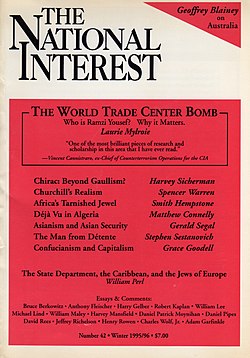American international affairs magazine
This article is about the magazine. For the general term, see National interest.
 Winter 1995/96 cover | |
| Editor | Jacob Heilbrunn (since July 2013) |
|---|---|
| Categories | International affairs |
| Frequency | Bi-monthly |
| Founder | Irving Kristol |
| Founded | 1985 |
| First issue | 1985 |
| Company | National Affairs, Inc. (1985–2001) Center for the National Interest (2001–present) |
| Country | United States |
| Based in | Washington, D.C., U.S. |
| Website | nationalinterest |
| ISSN | 0884-9382 |
The National Interest (TNI) is an American bimonthly international relations magazine edited by American journalist Jacob Heilbrunn and published by the Center for the National Interest, a public policy think tank based in Washington, D.C., that was established by former U.S. President Richard Nixon in 1994 as the Nixon Center for Peace and Freedom. The magazine is associated with the realist school of international studies. [1]
